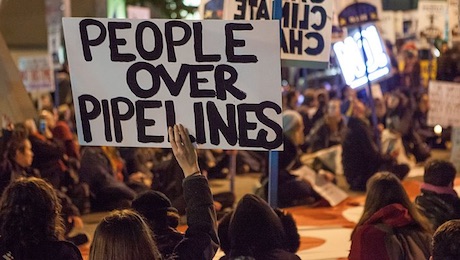Vermont’s attorney general TJ Donovan has joined a band of Democrat attorneys general to sue the Trump administration over environmental deregulations. All 21 attorneys general involved in the lawsuit are Democrats.
The rollback deals with the 50-year-old National Environmental Policy Act (NEPA) signed by President Richard Nixon in 1970. This act requires that all federal agencies consider the environmental impact of federal projects, including energy development such as power plants and pipelines.
The coalition of attorneys general argues that the deregulation takes public input out of the development process. They also say this move violates the Administrative Procedure Act.
“NEPA requires the federal government to think about the environment before it acts,” Donovan said in a recent statement. “My office will stand up for the environment and fight any attempts by the federal government to roll back this bedrock environmental law.”

ECONOMY VS. ENVIRONMENTALISM: The Trump administration says environmental assessments required for federal projects hinder economic development.
On July 15, the Trump administration’s Council on Environmental Quality made the announcement that they would be loosening the requirements when federal agencies follow these environmental impact assessments every time a new project is built. Trump commented on the matter in July, saying the process has held up projects as basic road construction for more than a decade.
“This is a truly historic breakthrough that means better roads, bridges, and tunnels for every UPS driver and every citizen across our land,” Trump said. “It should not take 10 years of approval for a simple stretch of road. … We’re going to give every project a clear answer: Yes or no.”
In the statement from Donovan’s office, they argue that any federal agency that takes any “major Federal actions significantly affecting the quality of the human environment” must adhere to NEPA. To comply with NEPA under the previous rules meant considering a project’s impacts on the environment or any options that can mitigate those impacts.
Such actions that may require NEPA compliance include “the approval of significant energy and infrastructure projects to key decisions concerning the management of federal public lands.”
With Trump’s actions to expedite development processes, Donovan’s office says it renders NEPA into a “meaningless paperwork exercise.”
In support of the president on this decision is U.S. Chamber of Commerce CEO Tom Donohue, who said the deregulations “will establish timelines for a decision and make requirements more straightforward.”
Other supporters include Mike Sommers, president and chief executive of the American Petroleum Institute, and Erik Milito, president of the National Ocean Industries Association.
Sommers said this move by Trump will “not only modernized pipeline infrastructure we need to deliver cleaner fuels but highways, bridges, and renewable energy.”
Milito said this move by Trump will help with the development of renewable energy projects including wind farms, a technology that has a mixed environmental record.
“A brighter future awaits countless projects, including planned offshore wind farms up and down the Atlantic Coast with the billions of dollars of investment and tens of thousands of American jobs they will bring,” he said.
The Energy Legal Blog also suggests that the previous requirements to adhere to NEPA were overly cumbersome. They state that there is still going to be a public review of projects.
“Since NEPA was enacted in 1970, implementation has become unwieldy and often does not serve NEPA’s purpose in informing decision-makers and the public,” they state. “The Final Rule marks the first comprehensive revision of CEQ’s NEPA regulations since the original regulations were promulgated in 1978, and it is intended to focus the NEPA review to serve its purpose of informing decision-makers and the public.”
Trump says that environmental reviews are still going to happen, but the approval process will be limited to two years or less and will only require one federal agency to issue approval compared to multiple agencies were reviewing projects before.
Some environmentalists on Twitter make the argument that Trump’s actions on the deregulation of federal projects are going to hurt minority communities.
ICYMI – More than 20 states filed a lawsuit to stop the Trump administration’s illegal rollbacks to the National Environmental Policy Act (#NEPA). Trump’s rollbacks would disproportionately harm Black, Brown and Indigenous communities. #ProtectYourVoicehttps://t.co/YE4nJJRGhM
— Center 4 Food Safety (@CFSTrueFood) August 31, 2020
Donovan joins the attorneys general of California, Colorado, Connecticut, Delaware, Illinois, Maine, Maryland, Massachusetts, Michigan, Minnesota, Nevada, New Jersey, New Mexico, New York, North Carolina, Oregon, Pennsylvania, Rhode Island, Washington, Wisconsin, the District of Columbia.
Also, Guam, New York City, Harris County, the Connecticut Department of Environmental Protection, and the New York State Department of Environmental Conservation are involved in the lawsuit.
Michael Bielawski is a reporter for True North. Send him news tips at bielawski82@yahoo.com and follow him on Twitter @TrueNorthMikeB.



Last I heard a presidential regulation is nothing more than an item on a president’s wish list. It’s only binding as long as a sucessor supports it. If not, a president can recind it if he so chooses. I would expect that an Attorney General would understand that. Not in Vermont!!!
TJ Donovan just another Liberal ” Follower ” , this is what you get when
you give these fools a job…… Agenda, Agenda only.
Wasting tax-payer money on foolishness, let’s see the data TJ, you have
nothing just talking points…….. what a disappointment !!!
Follow the money, you’ll get your answers.
Donovan is a communist scumbag. In every solitary way.
Fine. But if Vermont’s AG can’t show tangible benefits to their effort, they should be required to personally refund the costs of the litigation back to the taxpayers, including their labor costs.
we are free to handle the environment as we like…..it doesn’t prevent us from being good stewards of the land, it opens up new and inventive ways should we desire.
This is only a way to get attention.